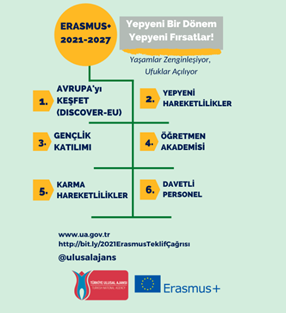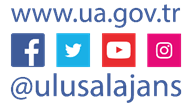
The Press Conference for the 2021-2027 Erasmus + Program was held on 25 March 2021 by the Commission. You can access the Press Release from the Link. With the Press Meeting, general information about the program, new activities and the budget of the Program are included in the Erasmus+ Call for Proposals of 2021 and the Programme Guide. You can access the 2021 Erasmus + Call for Proposals and Program Guide from the underlined link addresses.
The Commission today adopted the first annual work programme of Erasmus+ 2021-2027. With a budget of €26.2 billion, (compared to €14.7 billion for 2014-2020), complemented with about €2.2 billion from EU's external instruments, the new and revamped programme will fund learning mobility and cross-border cooperation projects for 10 million Europeans of all ages and all backgrounds. It will seek to be even more inclusive and to support the green and digital transitions, as set out in the European Education Area. Erasmus+ will also support the resilience of education and training systems in the face of the pandemic.
The new Erasmus+ programme provides opportunities for study periods abroad, traineeships, apprenticeships, and staff exchanges in all fields of education, training, youth and sport. It is open to school pupils, higher education and vocational education and training students, adult learners, youth exchanges, youth workers and sport coaches.
Some of the innovations have been summarized below. For all the innovations and details, you can review the Erasmus + Program Guide.

New activities drawing attention in the Erasmus + Program between 2021-2027:
- With Discover Europe (DiscoverEU), one of these activities, 18-year-olds will be able to visit the historical, touristic and cultural sites of Europe alone or with groups of friends with an interrail ticket.
- The Youth Participation activity will provide young people with the opportunity to present projects to participate in democratic life, raise awareness about common values and fundamental rights, and come together with decision makers.
Since 2021, it is also possible for school-age students and adult learners to participate in courses and educational activities in Europe.
Distinctively the previous years, with the Erasmus + Program, doctoral students will be able to study at universities abroad with short-term activities.
- By creating networks and practice communities on teacher education with Teacher Academies, training programs for the professional development of our teachers will be designed. For this purpose, teacher training providers and continuing professional development providers; They will bring together other relevant actors such as ministries and stakeholders.
-As a brand new activity, grant opportunities will be offered to sports coaches and staff to participate in trainings in Europe in order to support their professional development as of 2022, within the scope of the Erasmus + Program.
- Institutions will be able to invite people such as teachers, business people, experts and trainers from abroad to improve education and training.
In the period of 2021-2027, education and internship mobility can be done in the form of mixed mobility including digital education in addition to physical mobility.
- Until this year, Jean Monnet activities, which were only open to higher education institutions and allowed European Studies, will be implemented in sectors other than higher education such as school and vocational education from 2021.
- In the Cooperation Partnership projects prepared by the institutions and organizations, a separate activity was defined for the projects to be carried out by smaller-budget, short-term and small-scale institutions and organizations: Small-Scale Cooperation Partnerships.
-Erasmus + Mobile Application will provide students with a single online access point to all the information and services they need before, during and after their exchange abroad: erasmusapp.eu
With the announced Erasmus + Call for Proposals, the application dates for the 2021 Erasmus + Program have also been announced:
School Education, Vocational Education, Adult Education, Youth and Higher Education
Individuals' Learning Mobility (KA1) Applications: 11 May 2021
Applications for Cooperation Partnerships (KA2) in the fields of School Education, Vocational Education, Adult Education, Youth, Higher Education and Sports: 20 May 2021
For information about the 2021 Erasmus + Call for Proposals and the deadlines for all activities, click here.
For all current developments, follow our social media accounts at @ulusalajans:
